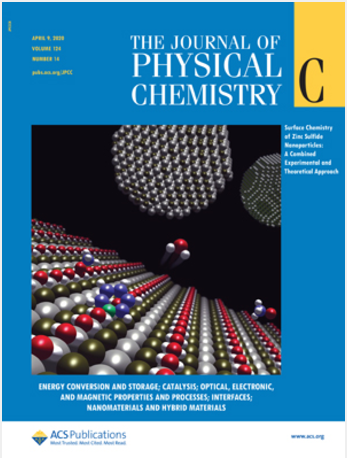对 Ru(0001) 表面戊烷催化氧化反应机理的见解
IF 3.3
3区 化学
Q2 CHEMISTRY, PHYSICAL
引用次数: 0
摘要
开发轻烷向烯烃或含氧化合物的高效和选择性氧化转化技术,对于推进更清洁、更高效的化学工艺至关重要。需要一种合适的选择性催化剂来简化反应条件,并确保形成所需的含氧化合物。在此,我们利用周期密度泛函理论研究了一种钌催化剂是否适用于利用分子氧对正戊烷进行部分氧化。该过程的第一步涉及脂肪族链中一级或二级碳的脱氢,从而在金属表面形成吸附氢化物结构。该中间体可通过不同的反应途径生成各种产物。连续脱氢过程比第一次氧化脱氢过程更快,可生成戊烯和一个水分子。或者,羟基与戊基氢化物的直接作用产生酒精。原子模拟显示,Ru 是催化烷烃转化为烯和含氧化合物的合适候选物质。作为一项重要成果,我们观察到催化氧化脱氢比直接催化脱氢更能从烷烃中生成烯烃。本文章由计算机程序翻译,如有差异,请以英文原文为准。

Insights into Catalytic Oxidative Reaction Mechanisms of Pentane on the Ru(0001) Surface
Developing efficient and selective oxidative transformations of light alkanes into alkenes or oxygenates is vital for advancing to cleaner and more efficient chemical processes. A suitable selective catalyst is required to ease reaction conditions and ensure the formation of desired oxygenated compounds. Here, using periodic density functional theory, we have investigated the suitability of a ruthenium catalyst for the partial oxidation of n-pentane using molecular oxygen. The first step of the process involves the dehydrogenation of primary or secondary carbons in the aliphatic chain, resulting in an adsorbed hydride structure on the metal surface. The intermediate may proceed through different reaction pathways, leading to various products. The successive dehydrogenation, a faster process than the first oxidative dehydrogenation, produces pentene and a water molecule. Alternatively, the direct interaction of the hydroxyl group with the pentyl hydride produces alcohol. The atomistic simulations reveal that Ru is a suitable candidate for catalyzing the conversion of alkanes into alkenes and oxygenates. As a significant outcome, we have observed that catalytic oxidative dehydrogenation is more feasible than direct catalytic dehydrogenation for yielding olefins from alkanes.
求助全文
通过发布文献求助,成功后即可免费获取论文全文。
去求助
来源期刊

The Journal of Physical Chemistry C
化学-材料科学:综合
CiteScore
6.50
自引率
8.10%
发文量
2047
审稿时长
1.8 months
期刊介绍:
The Journal of Physical Chemistry A/B/C is devoted to reporting new and original experimental and theoretical basic research of interest to physical chemists, biophysical chemists, and chemical physicists.
 求助内容:
求助内容: 应助结果提醒方式:
应助结果提醒方式:


